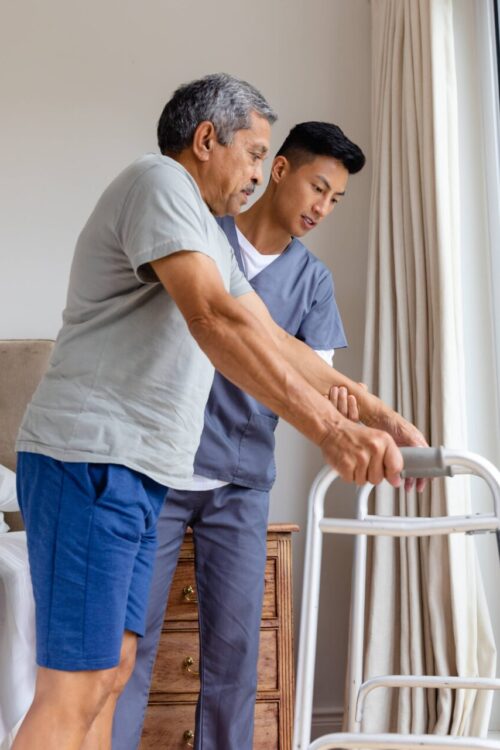260 S. Schmidt Road, Suite H3
Bolingbrook, IL 60440
Mon-Fri 9AM-3PM
Available 24/7 via phone
Bolingbrook, IL 60440
Available 24/7 via phone

Are you looking for care in nursing homes in Chicago area? Elevated Care at Home goes beyond the traditional model of in-home care. We understand that seniors’ needs evolve, and their living situations may vary, making professional and safe care in nursing homes in Chicago area necessary. Whether your loved one resides in a nursing home, is recovering from a recent hospitalization within a nursing home setting, or prefers to remain independent at home, we offer a range of supplementary services to enhance their well-being. Our care in nursing homes in Chicago area is well-loved and is the perfect solution to your caregiving problems.
Our team of experienced caregivers provides comprehensive, non-medical care. We take a personalized approach, tailoring our services to address each senior’s unique needs and preferences. This might include companionship to combat loneliness and social isolation, light housekeeping and errands to ease daily burdens, or assistance with meal preparation to ensure proper nutrition.
Our non-medical care in nursing homes in Chicago area can provide a comforting and familiar presence for seniors in nursing homes. We can bridge the gap between medical care and emotional well-being, offering compassionate support and engaging in meaningful activities to enrich their daily lives. Additionally, our caregivers can assist those recovering from hospitalization within a nursing home to regain strength and independence, promoting a smoother transition back to their preferred living situation.
Elevated Care at Home is committed to empowering seniors to live life fully, regardless of their environment. We offer peace of mind to families by ensuring their loved ones receive the support and attention they deserve, fostering a sense of security and well-being throughout their golden years.
Live-in care offers continuous support for seniors in their own homes. There are three main options, each with different levels of care and cost.
This option provides 24-hour care with breaks for the caregiver. A single caregiver works most of the week, offering hourly care. They receive a designated sleeping space and an 8-hour sleep period at night, though interruptions for nighttime needs are possible. Additionally, they have a 4-hour break during the day. A secondary caregiver may cover these breaks depending on the care recipient's needs and the family's preference. On the caregiver's off days, another caregiver takes over.
This option focuses on specific times of need. The caregiver arrives a few hours before bedtime and stays through the night to assist if required. They leave in the morning after helping the recipient wake up. In most cases, the caregiver can sleep at night if the recipient doesn't need assistance. This care can be live-in, with the caregiver staying home for nighttime security or "on-call" support. Their presence is not expected to be necessary every night.
The best live-in care option depends on the individual's needs. Consider the level of assistance required, the family's budget, and the recipient's preference for having a single caregiver or multiple caregivers present.
This option offers continuous, round-the-clock care for individuals with more complex needs. Two or three caregivers work shifts, typically 8 to 12 hours, ensuring constant support. Sleeping breaks are generally not included unless the family specifically allows them.

When a senior loved one transitions from the hospital back home, recovery often requires additional support. Our care in nursing homes in Chicago area plays a crucial role in ensuring a smooth transition and promoting a safe and healthy environment for healing. Here are some everyday tasks professional caregivers handle when caring for recently hospitalized seniors:
Seniors recovering from surgery or illness may require assistance with walking, transferring from bed to chair, or navigating stairs. Our care in nursing homes in Chicago area provides physical support to ensure safe movement and prevent falls.
For seniors with limited mobility, our care in nursing homes in Chicago area can assist with bathing, dressing, toileting, and grooming. This promotes hygiene and maintains the senior's dignity.
Proper nutrition is crucial for healing. Our care in nursing homes in Chicago area can help with meal planning, grocery shopping, preparing nutritious meals, and feeding those who need assistance. They ensure that dietary requirements and restrictions are followed.
Our care in nursing homes in Chicago area ensures seniors take their medications on time and in the correct dosage. They can organize pillboxes and provide reminders to prevent missed doses.
Our care in nursing homes in Chicago area observes for any adverse reactions or side effects from medications and report them to healthcare professionals promptly.
Recovery can be isolating, especially for seniors living alone. Our care in nursing homes in Chicago area provides companionship by engaging in conversation, playing games, or simply offering a listening ear, which can combat loneliness and boost emotional well-being.
Hospitalization can sometimes lead to confusion, anxiety, or depression. Our care in nursing homes in Chicago area can help identify signs of mental health concerns and report them to healthcare professionals.
Caregivers help seniors reconnect with friends and family by facilitating phone calls, video chats or accompanying them on outings (with the doctor's approval).
Caregivers liaise between the seniors, their families, and medical professionals. They communicate concerns, relay updates on the senior’s condition, and ensure continuity of care.
Caregivers document the senior’s daily activities, medical needs, and progress. This information is crucial for healthcare professionals to monitor recovery and make informed decisions.
Regular communication with family members informs them about the senior’s progress and provides peace of mind. Caregivers facilitate clear communication and address any family concerns promptly.
By providing these comprehensive services, professional caregivers play a vital role in supporting the well-being of elderly individuals transitioning from hospitalization to the comfort of their homes. They ensure seniors receive the physical, emotional, and medical support needed for a successful recovery.
Experience compassionate and personalized care in nursing homes in Chicago area with Elevated Care at Home. Our dedicated team ensures your loved ones receive the highest quality support and attention they deserve.
Contact us today to learn more about our exceptional care services and how we can make a difference in their lives.
Elevated Care At Home is dedicated to providing the highest quality of care to those in need. Our goal is to enhance the lives of our patients and their families by providing comfort, support, and dignity. …more.